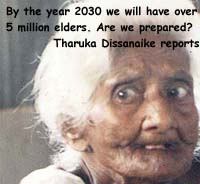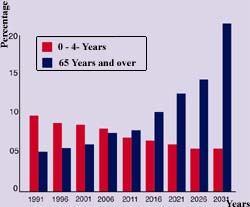 |
 5th July 1998 |
Front Page| |
 Cards of peace, words of hope |
Contents
|
|
 |
An elderly uprising?By the year 2030 we will have over 5 million elders. Are we prepared? Tharuka Dissanaike reports Mr. de Silva is des- perate. His accu- mulated debt has reached a lakh and he cannot figure out how he could pay it back. Mr. de Silva's pension is just Rs. 2500. With this meagre sum, he lives with his elderly wife in a rented house in a Colombo suburb.
But director N.J. Pathirana said, "There is no provision for us to settle outstanding debt." She said that a letter sent to People's Bank, requesting assistance to help the couple in the form of a bank loan, went unanswered. Her suggestion is that the couple leave their rented house and live in an old people's home, save up the pension money and pay back the loans. But for de Silva that's hardly an option-who likes to be in a home? At his age, when the society and country should make his burden's lighter, de Silva has to live hiding from his debtors. Old age is a problem. It brings with it a number of concerns ranging from care and shelter for the aged, pensions, health and medicine costs. In this country, the problem is peculiar because: The real problem will be upon us next century. According to very conservative figures our population of 60-over will increase from the present 9 percent to 22 percent in year 2031. In actual numbers this would mean a staggering increase from 1.6 million in 1996 to 5 million in 2031. The problem of 'population ageing at the top' is common in developed countries where better health facilities have guaranteed longevity and slowed population growth.
This positive indication of development has in fact created the problem of population ageing. And it is the working age group of today who will constitute the larger aged population in the next century. Of course there is no way the trend can be reversed. But problems and issues have to be looked at seriously. "Lest we have an elderly uprising," Ms. Pathirana said. The biggest challenge will be the care of this large elderly population. The changing patterns in society where housing is becoming smaller and more compact, where women are employed, where domestics are difficult to come by, where healthcare is a burden, dictates that most families cannot afford to keep their elderly relations within the family group. "There is a large demand for old people's homes. Not just the poorer sections but the rich too demand better paying homes for their elders," Ms. Pathirana said. Another problem is the pension scheme that is effective today. A person who retires now, will have his pension determined by his last drawn salary. In five or ten years, this pension will hardly be adequate in the face of inflation and cost of living. Other elders, mostly destitutes, receive a tiny government allowance of Rs. 100-300. This too, monthly. Health care, even in government clinics, is not easily accessed and medicines are expensive especially for chronic illness. Banks and financial institutions offer little relief for elders in terms of loans. Hospitals discriminate against the elderly upon admittance. Except for few elders who are blessed with good health and are fortunate to enjoy strong family support, others largely face a helpless situation. Is this the situation that the increasing elderly population will walk into in the future? Director, Census and Statistics Department, A.W. Nanayakkara states in a report, "The rapid growth of elderly persons is indeed a process of considerable social consequence." He says that an annual addition of about 100,000 into the elderly age group will mean that these numbers will have to be economically supported since by law, retirement age is 55-60 in this country. He also said that their projects are not taking into account the large loss of young life in civil wars in the country. Although unaccounted for, this might yet contribute to enlarging the problem, since on both sides youth populations are lost in violence. How is the government planning to deal with the burden of caring for the large aged population in the future? The Government, having been warned early of the problems of population ageing has initiated a National Committee on Ageing which is chaired by the Secretary of the Ministry of Social Services. It meets monthly and looks at policy changes and practical steps to address immediate issues concerning shelter and care. The Committee recommendations so far include-
More Plus * There should have been ghosts
Front Page| News/Comment| Editorial/Opinion| Business| Sports | Mirror Magazine |
|
 |
Please send your comments and suggestions on this web site to |
|
 Unable
to meet their day to day needs, the couple had sunk into debt- perhaps
to buy their medicines and essentials, which they could not afford on his
pension. Then the debtors closed in. And the aged couple having no one
to depend on- their children had migrated ended in running to the Social
Services Department for help.
Unable
to meet their day to day needs, the couple had sunk into debt- perhaps
to buy their medicines and essentials, which they could not afford on his
pension. Then the debtors closed in. And the aged couple having no one
to depend on- their children had migrated ended in running to the Social
Services Department for help. c
And it has steadily increased. In 1920 life expectancy was 30 years. But
today ( 1992 estimates) it is 71, far ahead of India's 60, and comparable
with Singapore's 74.
c
And it has steadily increased. In 1920 life expectancy was 30 years. But
today ( 1992 estimates) it is 71, far ahead of India's 60, and comparable
with Singapore's 74.